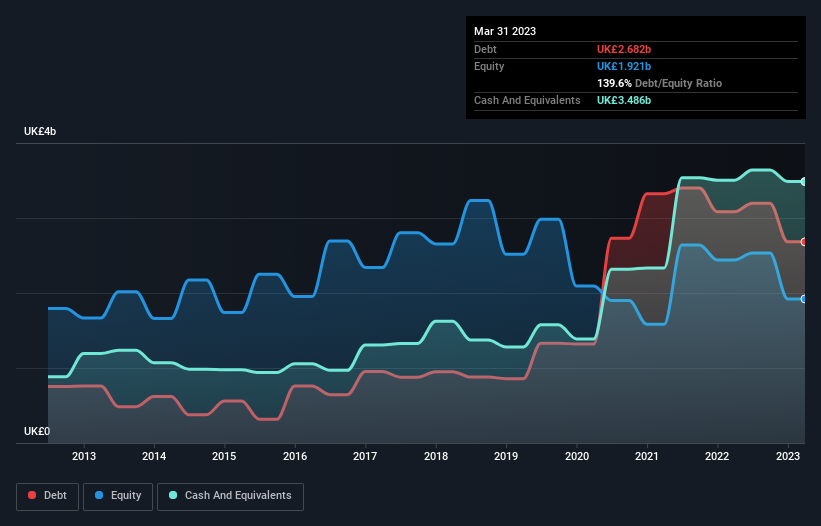Warren Buffett famously said, 'Volatility is far from synonymous with risk.' When we think about how risky a company is, we always like to look at its use of debt, since debt overload can lead to ruin. As with many other companies easyJet plc (LON:EZJ) makes use of debt. But is this debt a concern to shareholders?
When Is Debt A Problem?
Debt and other liabilities become risky for a business when it cannot easily fulfill those obligations, either with free cash flow or by raising capital at an attractive price. Part and parcel of capitalism is the process of 'creative destruction' where failed businesses are mercilessly liquidated by their bankers. While that is not too common, we often do see indebted companies permanently diluting shareholders because lenders force them to raise capital at a distressed price. Having said that, the most common situation is where a company manages its debt reasonably well - and to its own advantage. The first step when considering a company's debt levels is to consider its cash and debt together.
Check out our latest analysis for easyJet
What Is easyJet's Debt?
The image below, which you can click on for greater detail, shows that easyJet had debt of UK£2.68b at the end of March 2023, a reduction from UK£3.08b over a year. However, it does have UK£3.49b in cash offsetting this, leading to net cash of UK£804.0m.

How Healthy Is easyJet's Balance Sheet?
The latest balance sheet data shows that easyJet had liabilities of UK£5.02b due within a year, and liabilities of UK£3.60b falling due after that. Offsetting these obligations, it had cash of UK£3.49b as well as receivables valued at UK£373.0m due within 12 months. So its liabilities total UK£4.76b more than the combination of its cash and short-term receivables.
When you consider that this deficiency exceeds the company's UK£3.76b market capitalization, you might well be inclined to review the balance sheet intently. In the scenario where the company had to clean up its balance sheet quickly, it seems likely shareholders would suffer extensive dilution. easyJet boasts net cash, so it's fair to say it does not have a heavy debt load, even if it does have very significant liabilities, in total.
We also note that easyJet improved its EBIT from a last year's loss to a positive UK£85m. The balance sheet is clearly the area to focus on when you are analysing debt. But it is future earnings, more than anything, that will determine easyJet's ability to maintain a healthy balance sheet going forward. So if you're focused on the future you can check out this free report showing analyst profit forecasts.
Finally, a company can only pay off debt with cold hard cash, not accounting profits. easyJet may have net cash on the balance sheet, but it is still interesting to look at how well the business converts its earnings before interest and tax (EBIT) to free cash flow, because that will influence both its need for, and its capacity to manage debt. Over the last year, easyJet actually produced more free cash flow than EBIT. That sort of strong cash conversion gets us as excited as the crowd when the beat drops at a Daft Punk concert.
Summing Up
Although easyJet's balance sheet isn't particularly strong, due to the total liabilities, it is clearly positive to see that it has net cash of UK£804.0m. And it impressed us with free cash flow of UK£542m, being 638% of its EBIT. So while easyJet does not have a great balance sheet, it's certainly not too bad. Given our hesitation about the stock, it would be good to know if easyJet insiders have sold any shares recently. You click here to find out if insiders have sold recently.
Of course, if you're the type of investor who prefers buying stocks without the burden of debt, then don't hesitate to discover our exclusive list of net cash growth stocks, today.
New: Manage All Your Stock Portfolios in One Place
We've created the ultimate portfolio companion for stock investors, and it's free.
• Connect an unlimited number of Portfolios and see your total in one currency
• Be alerted to new Warning Signs or Risks via email or mobile
• Track the Fair Value of your stocks
Have feedback on this article? Concerned about the content? Get in touch with us directly. Alternatively, email editorial-team (at) simplywallst.com.
This article by Simply Wall St is general in nature. We provide commentary based on historical data and analyst forecasts only using an unbiased methodology and our articles are not intended to be financial advice. It does not constitute a recommendation to buy or sell any stock, and does not take account of your objectives, or your financial situation. We aim to bring you long-term focused analysis driven by fundamental data. Note that our analysis may not factor in the latest price-sensitive company announcements or qualitative material. Simply Wall St has no position in any stocks mentioned.
About LSE:EZJ
Adequate balance sheet with acceptable track record.
Similar Companies
Market Insights
Community Narratives



